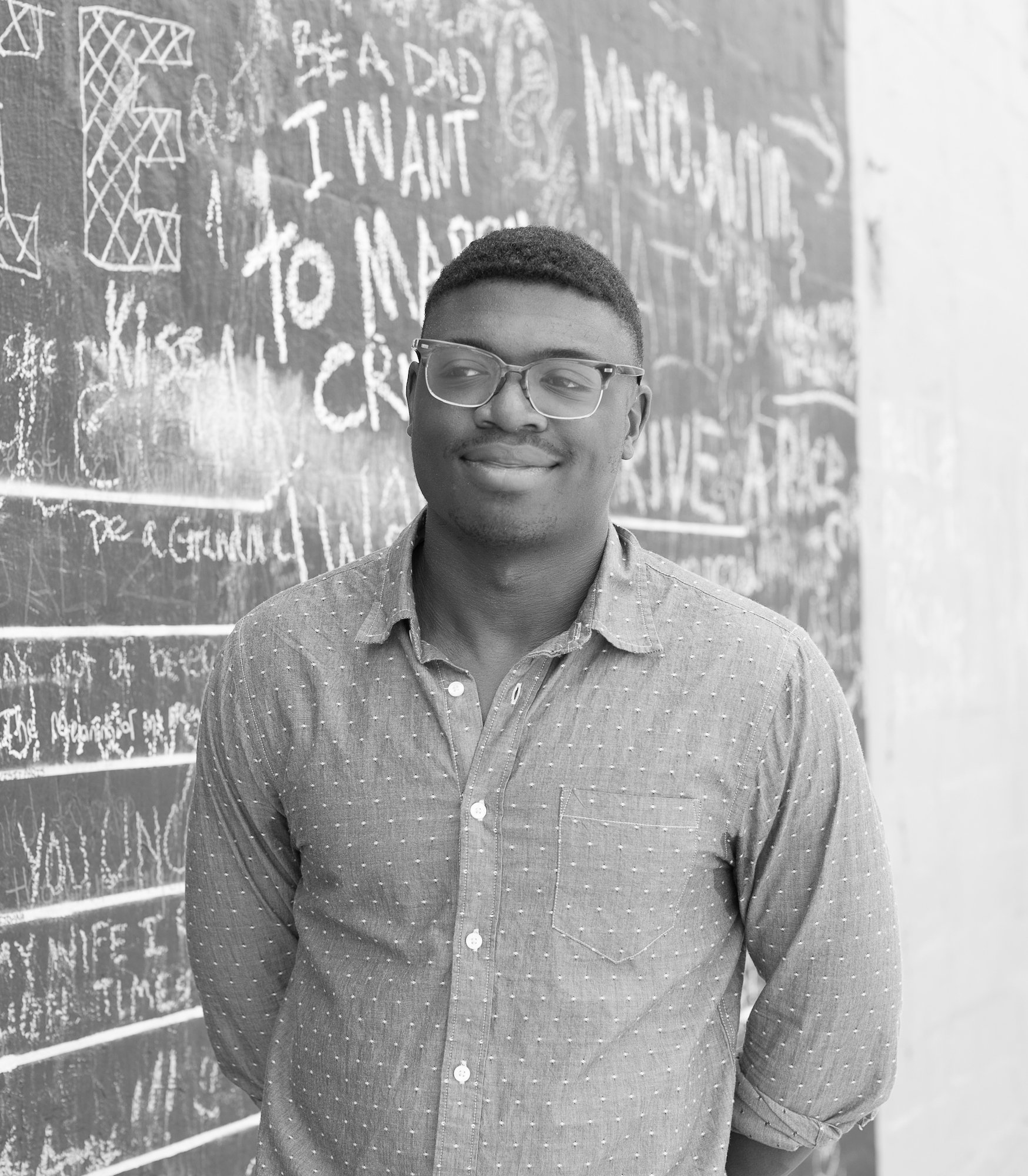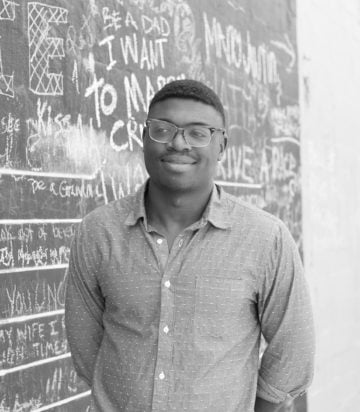
Short Story Contest Finalist: ‘Navigation’

“Try unearthing something fresh” is Amelia Gray’s advice to writers of short fiction. “The best stories have something that needs to be said urgently: now, today, this very moment.”
Freshness and urgency is a difficult combination for a writer to achieve, but many entrants in this year’s Observer short story contest, guest judged by Gray, hit the mark. The five finalists are arguably our strongest batch yet, but getting there required some punishing decisions.
So far you’ve read Nancy Dinan’s “Melanie Lewis Plays Dominoes,” Fernando Flores’ “Lee Harvey in His Element,” and “Only Animals” by Chelsea Sutton.
Today we close out the finalists with Bryan Washington’s “Navigation,” a wonderful story about what the writer calls a “linguistic transaction” in Houston’s Second Ward.
You can find the winning story in our October print issue, or online soon after the issue’s release.
***
It started how you’d think, with this whiteboy throwing up in an alley. I’d pulled a job at a taqueria dumping pig guts out back. The cooks gave me grunt work, the way they do when you’re starting out, and it didn’t matter that I’d been fixing mole in Ma’s kitchen for years — but I was short on money. My managers looked like gauchos, with porno moustaches, bloated frames. They read my name and they saw my face and they pointed to the dishes. One of them told me I looked like a pinche negrito, y probablemente ni siquiera hablaba español, and I wanted to snatch his ears off but then I’d be out of a check.
So I should’ve left the whiteboy outside. I had enough on my plate.
But I stayed. Watched him heave. When he finished I came back with a glass of water.
He took me home. Dude had these little hairs climbing his belly. His eyes got wide at how furry my legs are. When we finished he gulped at the air in the room, he asked for my name, we were sliding down the futon, and when he couldn’t pronounce it the whiteboy gave me a new one.
He lived in a condo on Navigation. Said he stayed there because this was the real Houston. This Houston came with needles in the grass and air that could choke a baby, but he said I was lucky, lucky to have it all in front of me. I told him if somebody gave me an out, they wouldn’t have time to finish their sentence.
His bedroom was nice and the building was nicer. Wood flooring. Green walls. Like the inside of an avocado. I remembered when the lot had been cleared for construction, when it was just this busted Mattress Center I went to with Ma, but then the whiteboy started asking me what was wrong, and I said it was nothing, I was gassed, he ought to be proud of himself.
I grabbed my kicks and left is what should’ve happened next. That was my thing. And I did dip out, eventually.
But the whiteboy told me he had a job — he needed help with his Spanish, he was gunning for some promotion. He temped at some nonprofit over on Pease, a house for battered migrants. One of those places where everyone’s lived through everything. They needed help getting papers, with reaching their people back home, but if he couldn’t understand them then he couldn’t do much about it. What he really wanted was this position upstate, way out in Dallas, but they’d stuck him in the Second Ward.
The whiteboy told me I could expedite the process. Give him some lessons. Help him help the rest of the world.
I gave him this look like maybe I’d just beat his ass instead. Case his place for fun. It would be so easy.
He asked how much I made dumping napkins. He said he could double it. We’d keep it up as long as we had to. I asked why he didn’t just find someone else, someone official, and he said I was already in his bed.
It’s one of those moments where I could’ve done the good thing. Apropos of nothing. Hooked him up just for the sake of doing it.
I told him for fifty a session I’d think on it.
—
Meanwhile the taqueria was eating me alive. It was an ultra-retro dive, the kind with barbacoa roasting at dawn. A line of construction types looped the building every morning just to walk like twelve plates home to their kids. We had a guy whose job was sweeping people off of the sidewalk, waving them onto Leeland when the crowd shot through the doors. But somehow the gringos knew about us too, and by midafternoon we looked a lot less like el D.F. and more like the U.N.
One day some blondie yelled to the back for chilaquiles, and when no one else looked up I told the guy we didn’t do that. He was some snake in a suit. Glasses tucked and everything. He gave this slow nod, like, Well, OK, we’ll see.
I was sweeping under the fryers when one of the managers asked for a minute. Something’d come up. Could we touch on it outside. I thought that he’d ask me some bunk about my hours, but when we made it to the back he grabbed me by the throat.
Next time one of the blanquitos asks for something, he said, you find it. Claro?
I felt like a bobblehead.
I needed the money.
I picked up the phone at Ma’s that night, told the whiteboy I was free after ten.
—
Long story short, this guy was hopeless. It took four, five days to stuff the o into his hola.
We started with greetings. He had so many questions. He wanted to know why he couldn’t use usted with everyone. He wanted to know why the x had to be silent. He wanted to know why every morning had to be bueno.
Some days are just bad, he said. Some people live their whole lives and not a single good thing happens to them.
I told him those were just the rules. He should follow them unless he had something new to say.
I thought he’d bow out, because it really wasn’t worth it, but what he did was take notes. He wrote it all down.
Vámonos, I said.
Bamanos, said the whiteboy.
Vámonos. V. Think volcano.
Bamanos.
No. Vulcan. Velociraptor.
Right. Bamanos.
That’s how we did it. Had us a full-stop barrier.
And the people at his shelter — on the trains from Tapachula? San Pedro Sula?
Forget about it. They wouldn’t be talking anytime soon.
I told him this. I told him not to get his hopes up. He rubbed my earlobe with his fingers, said that was where I came in.
Hey, I said, don’t get too comfortable.
Cómodo, said the whiteboy. Cómodo?
Correcto.
So we kept it up.
And the whiteboy always paid me afterwards.
And we’d always, always, always, always end up in bed.
Lo siento.
Las siento.
Negative. Lo. Lo.
Las siento.
Weeks passed, then months. We moved from greetings to goodbyes. We brushed by commands. We jumped back to directions. I told him about my father in La Ceiba. About my brother in the ground. About Ma, stuck in the Tre, scrambling to keep everything together. The whiteboy told me about his sisters, about his parents in Alamo Heights, and when I asked how many guys he’d been with before me he told me about an ex, some genius over at Rice.
He asked if I was out. I told him I didn’t know what that meant. He asked if I’d thought about abandoning Houston, and I said if I had I’d have done it by now.
I kept my head down at the job. Did what I was asked to do. The kitchen was sloppy, utterly inefficient, but every now and again one of the cooks asked for a hand — with temping the oil, with keeping the cow heads intact, or some other no-brainer thing they should’ve known how to do.
They’d laugh afterwards, pat me with their gloves. Smear all that grease on the back of my tee.
Mostly I wiped benches. I scrubbed piss off of toilet seats.
My bosses spat on the tile I mopped, asked how my day was going.
I kept my mouth shut about it. I kept my eyes on the ground. Because if someone else put their hands on me, I didn’t know what I’d do.
Creo que sí.
Creole.
Creo, creo.
Creole, creole.
I started spending my nights with the whiteboy. Dropped whatever scraps I stole from the job over at Ma’s. Took the sidewalk lining Milby on the way to his condo, just before the neighborhood dips into the bayou, and most of the time the whiteboy met me at the door, he’d reheat a bowl of whatever he’d ordered for dinner.
We continued our education.
At some point I stopped jumping when he touched me.
At some point the whiteboy started rolling his r’s.
At some point I decided I’d make him fluent, however long that took, we would see that through.
—
Then one night, after a long day, we were rehashing phrases. Things he’d been hearing on his day-to-day. He’d started having piecemeal conversations at work, putting names and addresses together.
The whiteboy told me about me the woman who came to Texas in a Chrysler’s trunk, who worked off her debt by dancing in the Galleria.
He told me about the man who’d sold his oldest daughter to traffickers to get his youngest into Brownsville, and how he still hadn’t found her.
He told me about the little girl who hadn’t said anything, just touched his cheek, rubbing the skin between her fingers, and how after she’d done that he knew he couldn’t do anything to help her at all.
We had a six-pack between us, and his legs on my stomach, which should’ve been awkward for us. We weren’t even fooling with English by then. I was filling in his blanks.
Te amo, I said.
Te amo.
Nice. Good. Te amo.
Te amo.
Right.
Sí.
I laughed in his face, told him to say it again.
I dumped garbage all day, taught my whiteboy at night.
This is how things happen. Even for us.
—
A few weeks later, he got the promotion.
His supervisor said it wasn’t like he was a natural. But out of all the whiteboys they had on hand, he was the closest to whatever they needed.
A position’d opened up out in Dallas, if he wanted it. He had a few days to decide.
Of course we had to celebrate. We sat at his table, sober for once, and I told him that was great. He’d probably enjoy himself.
He made this face like that was the wrong response. I knew what he’d ask, and I answered before he said it.
He said I knew I could come too, and I told him I did.
He said this was it, what we’d been working towards, and I told him it may have been.
He said there was nothing left for me in Houston, he said I didn’t have to punish myself, and he said my name, my actual name, and I didn’t have the words for that.
I stretched my cheeks as far as they’d go. Put a hand on his thigh.
I grabbed my socks and my cap and my belt and I left and he did not put up a fight.
This is how easy it was to walk out of a life. I’d always wondered, and now I knew.
I didn’t see him before he took off.
Who knows what he’s doing now.
—
But a week or two later, I was working the night shift, scrubbing blood off the floor, when one of my managers asked for a word.
I’d already decided to put him in the dirt if he touched me. Someone, somewhere in East End, needed a fry cook. I’d twirl signs on the street. Dance on the curb in a phone suit.
He put his hand on my shoulder, and I clinched for the punch.
He told me they’d fired a couple of fatheads for pocketing tips. He called them idiot cabrones, as if he weren’t one himself.
But we need a guy who’s been in before, he said.
We’d start you slow, he said. Behind the stove. Work you up from the bottom.
You’re asking me to cook for you, I said, and he shrugged, said, If that’s what you want to call it.
I’m asking you to do yourself a solid, he said.
And if this were a different story, a story about something else, a story where we did the things we know we need to do, I’d have smiled real wide, the same as with the whiteboy, and with a little more feeling, or maybe a different one entirely — but I just put my hand on his shoulder, and I squeezed around the edges, and I loudly, gracefully, told him to go screw his mother.
***
Bryan Washington on “Navigation”:
“Navigation” is fiction, but it’s also not. This sort of linguistic transaction happens in Houston every day. It was tricky trying to capture the give-and-take of that in a story, and I spent a stupid amount of time mouthing gibberish at the wall. But then one day I ended up in the world’s longest line, at this taqueria downtown where the skyline fades away. The one guy in front of me, this oil-and-gas type, limped through a pidgin Spanish, but the cashier just nodded and smiled and spat it back at him in English. It was another five minutes before I realized they were flirting. A symphony went off in my head. Eventually I got my order, and I saw how I’d finish this story, and a couple of months later I finally did.


